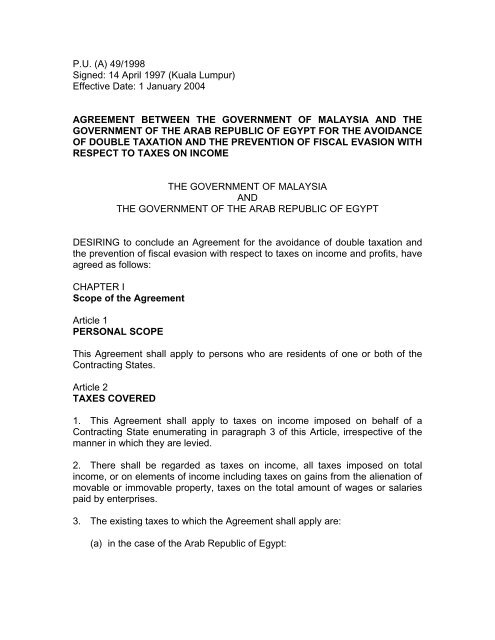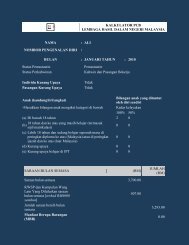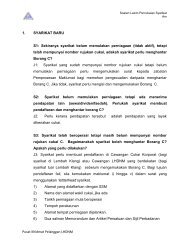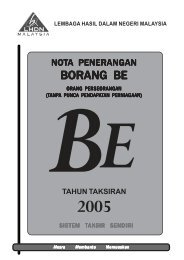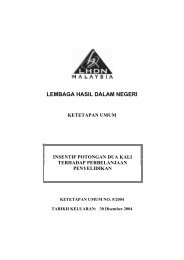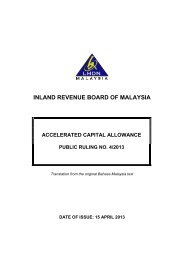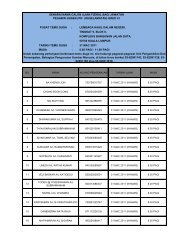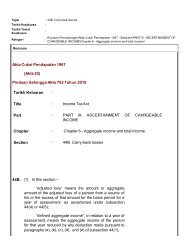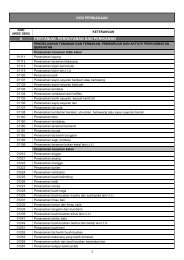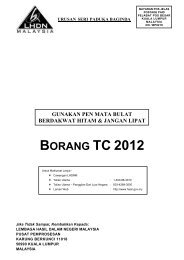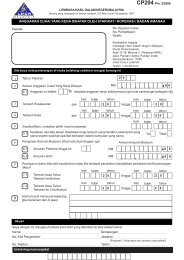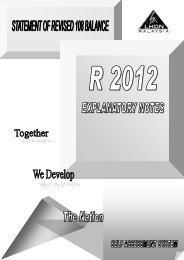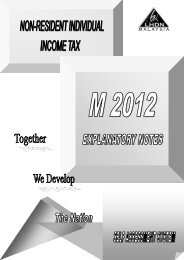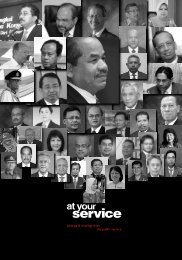Malaysia - Egypt
Malaysia - Egypt
Malaysia - Egypt
Create successful ePaper yourself
Turn your PDF publications into a flip-book with our unique Google optimized e-Paper software.
P.U. (A) 49/1998<br />
Signed: 14 April 1997 (Kuala Lumpur)<br />
Effective Date: 1 January 2004<br />
AGREEMENT BETWEEN THE GOVERNMENT OF MALAYSIA AND THE<br />
GOVERNMENT OF THE ARAB REPUBLIC OF EGYPT FOR THE AVOIDANCE<br />
OF DOUBLE TAXATION AND THE PREVENTION OF FISCAL EVASION WITH<br />
RESPECT TO TAXES ON INCOME<br />
THE GOVERNMENT OF MALAYSIA<br />
AND<br />
THE GOVERNMENT OF THE ARAB REPUBLIC OF EGYPT<br />
DESIRING to conclude an Agreement for the avoidance of double taxation and<br />
the prevention of fiscal evasion with respect to taxes on income and profits, have<br />
agreed as follows:<br />
CHAPTER I<br />
Scope of the Agreement<br />
Article 1<br />
PERSONAL SCOPE<br />
This Agreement shall apply to persons who are residents of one or both of the<br />
Contracting States.<br />
Article 2<br />
TAXES COVERED<br />
1. This Agreement shall apply to taxes on income imposed on behalf of a<br />
Contracting State enumerating in paragraph 3 of this Article, irrespective of the<br />
manner in which they are levied.<br />
2. There shall be regarded as taxes on income, all taxes imposed on total<br />
income, or on elements of income including taxes on gains from the alienation of<br />
movable or immovable property, taxes on the total amount of wages or salaries<br />
paid by enterprises.<br />
3. The existing taxes to which the Agreement shall apply are:<br />
(a) in the case of the Arab Republic of <strong>Egypt</strong>:
DTA MALAYSIA – EGYPT<br />
(i) tax on income derived from immovable property including the land<br />
tax and the building tax;<br />
(ii) unified tax on income of individuals levied by the law No.157 for the<br />
year 1981 and amended by the law No. 187 for the year 1993;<br />
(iii) corporation profits tax;<br />
(iv) development of the financial resources of the state, duty imposed by<br />
the law No. 147 for the year 1984 and its amendments; and<br />
(v) supplementary taxes imposed as percentages of taxes mentioned<br />
above or otherwise;<br />
(hereinafter referred to as "<strong>Egypt</strong>ian tax");<br />
(b) in the case of <strong>Malaysia</strong>:<br />
(i) the income tax; and<br />
(ii) the petroleum income tax;<br />
(hereinafter referred to as "<strong>Malaysia</strong>n tax").<br />
4. The Agreement shall also apply to any identical or substantially similar taxes<br />
which are imposed after the date of signature of this Agreement in addition to, or<br />
in place of the existing taxes. The competent authorities of the Contracting States<br />
shall notify each other of substantial changes which have been made in their<br />
respective taxation laws.<br />
CHAPTER II<br />
Definitions<br />
Article 3<br />
GENERAL DEFINITIONS<br />
1. For the purposes of this Agreement, unless the context otherwise requires:<br />
(a) (i) the term "<strong>Egypt</strong>" means the Arab Republic of <strong>Egypt</strong> and, when used<br />
in a geographical sense, it means:<br />
(a) the national territory;<br />
(b) the territorial sea;<br />
(c) the area beyond and adjacent to the territorial sea over which<br />
<strong>Egypt</strong> has sovereign rights for the purpose of exploring and<br />
exploiting, conserving and managing the natural resources<br />
2.
DTA MALAYSIA – EGYPT<br />
whether living or non-living of the waters superjacent to the<br />
seabed and of the sea-bed and its subsoil, and with regard to<br />
other activities for the economic exploitation and exploration of<br />
the area and other rights in accordance with international law;<br />
(d) the continental shelf;<br />
(ii) the term "<strong>Malaysia</strong>" means the territories of the Federation of<br />
<strong>Malaysia</strong>, the territorial waters of <strong>Malaysia</strong> and the sea-bed and<br />
subsoil of the territorial waters, and includes any area extending<br />
beyond the limits of the territorial waters of <strong>Malaysia</strong>, and the seabed<br />
and subsoil of any such area, which has been or may hereafter<br />
be designated under the laws of <strong>Malaysia</strong> and in accordance with<br />
international law as an area over which <strong>Malaysia</strong> has sovereign<br />
rights for the purposes of exploring and exploiting the natural<br />
resources, whether living or non-living;<br />
(b) the terms "a Contracting State" and "the other Contracting State" mean<br />
<strong>Egypt</strong> or <strong>Malaysia</strong> as the case may be;<br />
(c) the term "person" includes an individual, a company and any other body<br />
of persons which is treated as a person for tax purposes;<br />
(d) the term "company" means any body corporate or any entity which is<br />
treated as a body corporate for tax purposes;<br />
(e) the terms "enterprise of a Contracting State" and "enterprise of the other<br />
Contracting State" mean respectively an enterprise carried on by a<br />
resident of a Contracting State and an enterprise carried on by a resident<br />
of the other Contracting State;<br />
(f) the term "tax" means <strong>Egypt</strong>ian tax or <strong>Malaysia</strong>n tax as the context<br />
requires;<br />
(g) the term "international traffic" means any transport by a ship or aircraft<br />
operated by an enterprise which has its place of effective management in<br />
a Contracting State except when the ship or aircraft is operated solely<br />
between places in the other Contracting State;<br />
(h) the term "competent authority" means:<br />
(i) in the case of <strong>Egypt</strong>, the Minister of Finance or his authorized<br />
representative;<br />
(ii) in the case of <strong>Malaysia</strong>, the Minister of Finance or his authorised<br />
representative;<br />
3.
DTA MALAYSIA – EGYPT<br />
(i) the term "national" means:<br />
(i) any individual possessing the nationality or citizenship or a<br />
Contracting State;<br />
(ii) any legal person, partnership, association and any other similar<br />
entity deriving its status as such from the laws in force in a<br />
Contracting State.<br />
2. In the application of the Agreement by a Contracting State, any term not<br />
defined therein shall, unless the context otherwise requires, have the meaning<br />
which it has under the laws of that State concerning the taxes to which the<br />
Agreement applies.<br />
Article 4<br />
RESIDENT<br />
1. For the purposes of this Agreement, the term "resident of a Contracting<br />
State" means:<br />
(a) in the case of <strong>Malaysia</strong>, a person who is resident in <strong>Malaysia</strong> for the<br />
purposes of <strong>Malaysia</strong>n tax; and<br />
(b) in the case of <strong>Egypt</strong>, a person who is resident in <strong>Egypt</strong> for the purposes<br />
of <strong>Egypt</strong>ian tax.<br />
2. Where by reason of the provisions of paragraph 1 an individual is a resident<br />
of both Contracting States, then his status shall be determined as follows:<br />
(a) he shall be deemed to be a resident of the State in which he has a<br />
permanent home available to him; if he has a permanent home available<br />
to him in both States, he shall be deemed to be a resident of the State<br />
with which his personal and economic relations are closer (centre of vital<br />
interest);<br />
(b) if the State in which he has his centre of vital interests cannot be<br />
determined, or if he has not a permanent home available to him in either<br />
State, he shall be deemed to be a resident of the State in which he has<br />
an habitual abode;<br />
(c) if he has an habitual abode in both States or in neither of them he shall<br />
be deemed to be a resident of the State of which he is a national;<br />
(d) if he is a national of both States or of neither of them the competent<br />
authorities of the Contracting States shall settle the question by mutual<br />
agreement.<br />
4.
DTA MALAYSIA – EGYPT<br />
3. Where, by reason of the provisions of paragraph 1, a person other than an<br />
individual is a resident of both Contracting States, then it shall be deemed to be a<br />
resident of the State in which its place of effective management is situated.<br />
Article 5<br />
PERMANENT ESTABLISHMENT<br />
1. For the purposes of this Agreement, the term "permanent establishment"<br />
means a fixed place of business through which the business of an enterprise is<br />
wholly or partly carried on.<br />
2. The term "permanent establishment" shall include especially:<br />
(a) a place of management;<br />
(b) a branch;<br />
(c) premises used as sales outlets;<br />
(d) an office;<br />
(e) a factory;<br />
(f) a workshop;<br />
(g) a mine, an oil or gas well, a quarry or any other place of extraction of<br />
natural resources including timber or other forest produce; and<br />
(h) a farm or plantation.<br />
3. The term "permanent establishment" likewise encompasses a building site, a<br />
construction, assembly or installation project or supervisory activities in<br />
connection therewith but only where such site, project or activities continue for a<br />
period of more than six months.<br />
4. Notwithstanding the preceding provisions of this Article, the term "permanent<br />
establishment" shall be deemed not to include:<br />
(a) the use of facilities solely for the purpose of storage, display or<br />
occasional delivery of goods or merchandise belonging to the enterprise<br />
and deriving no profits;<br />
(b) the maintenance of a stock of goods or merchandise belonging to the<br />
enterprise solely for the purpose of storage, display or occasional<br />
delivery and deriving no profits;<br />
5.
DTA MALAYSIA – EGYPT<br />
(c) the maintenance of a stock of goods or merchandise belonging to the<br />
enterprise solely for the purpose of processing by another enterprise;<br />
(d) the maintenance of a fixed place of business solely for the purpose of<br />
purchasing goods or merchandise or of collecting information, for the<br />
enterprise;<br />
(e) the maintenance of a fixed place of business solely for the purpose of<br />
carrying on, for the enterprise, any other activities of a preparatory or<br />
auxiliary character.<br />
(f) the maintenance of a fixed place of business solely for any combination<br />
of activities mentioned in sub-paragraphs (a) to (e), provided that the<br />
overall activity of the fixed place of business resulting from this<br />
combination is a preparatory or auxiliary character.<br />
5. Notwithstanding the provisions of paragraphs 1 and 2 where a person --<br />
other than an agent of an independent status to whom paragraph 7 applies -- is<br />
acting in a Contracting State on behalf of an enterprise of the other Contracting<br />
State, that enterprise shall be deemed to have a permanent establishment in the<br />
first-mentioned Contracting State in respect of any activities which that person<br />
undertakes for the enterprise, if such a person has and habitually exercises in<br />
that State an authority to conclude contracts in the name of the enterprise, unless<br />
the activities of such person are limited to those mentioned in paragraph 4 which,<br />
if exercised through a fixed place of business, would not make this fixed place of<br />
business a permanent establishment under the provisions of that paragraph.<br />
6. Notwithstanding the preceding provisions of this Article, an insurance<br />
enterprise of a Contracting State shall, except in regard to re-insurance, be<br />
deemed to have permanent establishment in the other Contracting State if it<br />
collects premiums in the territory of that other State or insures risks situated<br />
therein through a person other than an agent of an independent status to whom<br />
paragraph 7 applies.<br />
7. An enterprise of a Contracting State shall not be deemed to have a<br />
permanent establishment in the other Contracting State merely because it carries<br />
on business in that other State through a broker, general commission agent or<br />
any other agent of an independent status, provided that such persons are acting<br />
in the ordinary course of their business. However, when the activities of such an<br />
agent are devoted wholly or almost wholly on behalf of that enterprise, he will not<br />
be considered an agent of an independent status within the meaning of this<br />
paragraph.<br />
8. The fact that a company which is a resident of a Contracting State controls or<br />
is controlled by a company which is a resident of the other Contracting State, or<br />
6.
DTA MALAYSIA – EGYPT<br />
which carries on business in that other State (whether through a permanent<br />
establishment or otherwise) shall not of itself constitute either company a<br />
permanent establishment of the other.<br />
Chapter III<br />
TAXATION OF INCOME<br />
Article 6<br />
INCOME FROM IMMOVABLE PROPERTY<br />
1. Income derived by a resident of a Contracting State from immovable property<br />
(including rental income from agriculture) situated in the other Contracting State<br />
may be taxed in that other State.<br />
2. For the purposes of this Agreement, the term "immovable property" shall be<br />
defined in accordance with the laws of the Contracting State in which the<br />
property in question is situated. The term shall in any case include property<br />
accessory to immovable property, livestock and equipment used in agriculture<br />
and forestry, rights to which the provisions of general law respecting landed<br />
property apply, usufruct of immovable property and rights to variable or fixed<br />
payments as consideration for the working of, or the right to work, mineral<br />
deposits, oil or gas wells, quarries and other places of extracting of natural<br />
resources including timber or other forest produce. Ships, boats and aircraft shall<br />
not be regarded as immovable property.<br />
3. The provisions of paragraph 1 shall apply to income derived from the direct<br />
use, letting, or use in any other form of immovable property.<br />
4. The provisions of paragraphs 1 and 3 shall also apply to the income from<br />
immovable property of an enterprise and to income from immovable property<br />
used for the performance of independent personal services.<br />
Article 7<br />
BUSINESS PROFITS<br />
1. The profits of an enterprise of a Contracting State shall be taxable only in<br />
that State unless the enterprise carries on business in the other Contracting<br />
State through a permanent establishment situated therein. If the enterprise<br />
carries on business as aforesaid, the profits of the enterprise may be taxed in the<br />
other State but only so much of them as is attributable to that permanent<br />
establishment.<br />
2. Subject to the provisions of paragraph 3, where an enterprise of a contracting<br />
State carries on business in the other Contracting State through a permanent<br />
establishment situated therein, there shall in each Contracting State be attributed<br />
to that permanent establishment the profits which it might be expected to make if<br />
7.
DTA MALAYSIA – EGYPT<br />
it were a distinct and separate enterprise engaged in the same or similar<br />
activities under the same or similar conditions and dealing wholly independently<br />
with the enterprise of which it is a permanent establishment.<br />
3. In the determination of the profits of a permanent establishment, there shall<br />
be allowed as deductions expenses which are incurred for the purpose of the<br />
business of the permanent establishment including executive and general<br />
administrative expenses so incurred whether in the State in which the permanent<br />
establishment is situated or elsewhere.<br />
4. No profits shall be attributed to a permanent establishment by reason of the<br />
mere purchase by that permanent establishment of goods or merchandise for the<br />
enterprise.<br />
5. In so far as it has been customary in a Contracting State to determine the<br />
profits to be attributed to a permanent establishment on the basis of an<br />
apportionment of the total profits of the enterprise to its various parts, nothing in<br />
paragraph 2 shall preclude that Contracting State from determining the profits to<br />
be taxed by such an apportionment as may be customary; the method of<br />
apportionment adopted shall however be such that the result shall be in<br />
accordance with the principles contained in this Article.<br />
6. For the purposes of the preceding paragraph, the profits to be attributed to<br />
the permanent establishment shall be determined by the same method year by<br />
year unless there is good and sufficient reason to the contrary.<br />
7. Where profits include items of income which are dealt with separately in<br />
other Articles of this Agreement, then the provisions of those Articles shall not be<br />
affected by the provisions of this Article.<br />
Article 8<br />
SHIPPING AND AIR TRANSPORT<br />
1. Profits from the operation of ships or aircraft in international traffic shall be<br />
taxable only in the Contracting State in which the place of effective management<br />
of the enterprise is situated.<br />
2. The provisions of paragraph 1 shall also apply to profits from the participation<br />
in a pool, a joint business or an international operating agency.<br />
Article 9<br />
ASSOCIATED ENTERPRISES<br />
Where:<br />
(a) an enterprise of a Contracting State participates directly or indirectly in the<br />
management, control or capital of an enterprise of the other Contracting State; or<br />
8.
DTA MALAYSIA – EGYPT<br />
(b) the same persons participate directly or indirectly in the management, control<br />
or capital of an enterprise of a Contracting State and an enterprise of the other<br />
Contracting State, and in either case conditions are made or imposed between<br />
the two enterprises in their commercial or financial relations which differ from<br />
those which would be made between independent enterprises then any profits<br />
which would, but for those conditions, have accrued to one of the enterprises,<br />
but, by reason of those conditions, have not so accrued, may be included in the<br />
profits of that enterprise and taxed accordingly.<br />
Article 10<br />
DIVIDENDS<br />
1. Dividends paid by a company which is a resident of a Contracting State to a<br />
resident of the other Contracting State may be taxed in that other State.<br />
2. Dividends paid by a company which is a resident of <strong>Malaysia</strong> to a resident of<br />
<strong>Egypt</strong> who is the beneficial owner thereof shall be exempt from any tax in<br />
<strong>Malaysia</strong> which is chargeable on dividends in addition to the tax chargeable in<br />
respect of the income of the company. Nothing in this paragraph shall affect the<br />
provisions of the <strong>Malaysia</strong>n law under which the tax in respect of a dividend paid<br />
by a company which is a resident of <strong>Malaysia</strong> from which <strong>Malaysia</strong>n tax has<br />
been, or has been deemed to be, deducted may be adjusted by reference to the<br />
rate of tax appropriate to the <strong>Malaysia</strong>n year of assessment immediately<br />
following that in which the dividend was paid.<br />
3. The term "dividends" as used in this Article means income from shares,<br />
"jouissance" shares or "jouissance" rights, mining shares, founders shares or<br />
other rights, not being debt-claims, participating in profits, as well as income from<br />
other corporate rights which is subjected to the same taxation treatment as<br />
income from shares by the laws of the State of which the company making the<br />
distribution is a resident.<br />
4. The provisions of paragraphs 1 and 2 shall not apply if the beneficial owner<br />
of the dividends, being a resident of a Contracting State, carries on business in<br />
the other Contracting State, of which the company paying the dividends is a<br />
resident, through a permanent establishment situated therein, and the holding in<br />
respect of which the dividends are paid is effectively connected with such<br />
permanent establishment. In such a case, the provisions of Article 7 shall apply.<br />
5. Where a company which is a resident of a Contracting State derives profits<br />
or income from the other Contracting State, that other State may not impose any<br />
tax on the dividends paid by the company, except in so far as such dividends are<br />
paid to a resident of that other State or in so far as the holding in respect of which<br />
the dividends are paid is effectively connected with a permanent establishment<br />
situated in that other State, nor subject the company's undistributed profits to a<br />
9.
DTA MALAYSIA – EGYPT<br />
tax on the company's undistributed profits even if the dividends paid or the<br />
undistributed profits consist wholly or partly of profits or income arising in such<br />
other State.<br />
Article 11<br />
INTEREST<br />
1. Interest arising in a Contracting State and paid to a resident of the other<br />
Contracting State may be taxed in that other State.<br />
2. However, such interest may also be taxed in the Contracting State in which it<br />
arises, and according to the laws of that State, but if the recipient is the beneficial<br />
owner of the interest the tax so charged shall not exceed 15 per cent of the gross<br />
amount of the interest.<br />
3. Notwithstanding the provisions of paragraph 2, interest to which a resident of<br />
<strong>Egypt</strong> is beneficially entitled shall be exempt from <strong>Malaysia</strong>n tax if the loan or<br />
other indebtedness in respect of which the interest is paid is an approved loan as<br />
defined in section 2(1) of the Income Tax Act, 1967 of <strong>Malaysia</strong>.<br />
4. Notwithstanding the provisions of paragraphs 2 and 3, the Government of a<br />
Contracting State shall be exempt from tax in the other Contracting State in<br />
respect of interest derived from the Government of that other Contracting State<br />
or companies or institutions wholly owned by the Government of either<br />
Contracting State.<br />
5. For the purposes of paragraph 4, the term "Government":<br />
(a) in the case of <strong>Malaysia</strong> means the Government of <strong>Malaysia</strong> and shall<br />
include:<br />
(i) the governments of the States;<br />
(ii) the local authorities;<br />
(iii) the statutory bodies;<br />
(iv) the Bank Negara <strong>Malaysia</strong>;<br />
(b) in the case of <strong>Egypt</strong> means the Government of Arab Republic of <strong>Egypt</strong><br />
and shall include:<br />
(i) the local authorities;<br />
(ii) the statutory bodies;<br />
10.
DTA MALAYSIA – EGYPT<br />
(iii) the Central Bank of <strong>Egypt</strong>.<br />
6. The term "interest" as used in this Article means income from debt-claims of<br />
every kind, whether or not secured by mortgage and whether or not carrying a<br />
right to participate in the debtor's profits, and in particular, income from<br />
government securities and income from bonds or debentures, including<br />
premiums and prices attaching to such securities, bonds or debentures.<br />
7. The provisions of paragraphs 1, 2 and 3 shall not apply if the beneficial<br />
owner of the interest, being a resident of a Contracting State, carries on business<br />
in the other Contracting State in which the interest arises through a permanent<br />
establishment situated therein and the debt-claim in respect of which the interest<br />
is paid is effectively connected with such permanent establishment. In such<br />
cases, the provisions of Article 7 shall apply.<br />
8. Interest shall be deemed to arise in a Contracting State when the payer is<br />
that State itself, a political subdivision, a local authority, statutory body or a<br />
resident of that State. Where, however, the person paying the interest, whether<br />
he is a resident of a Contracting State or not, has in a Contracting State a<br />
permanent establishment in connection with which the indebtedness on which<br />
the interest is paid was incurred, and such interest is borne by such permanent<br />
establishment, then such interest shall be deemed to arise in the State in which<br />
the permanent establishment is situated.<br />
9. Where, by reason of a special relationship between the payer and the<br />
beneficial owner or between both of them and some other person, the amount of<br />
the interest having regard to the debt-claim for which it is paid, exceeds the<br />
amount which would have been agreed upon by the payer and the beneficial<br />
owner in the absence of such relationship, the provisions of this Article shall<br />
apply only to the last-mentioned amount. In such case, the excess part of the<br />
payment shall remain taxable according to the laws of each Contracting State,<br />
due regard being had to the other provisions of this Agreement.<br />
Article 12<br />
ROYALTIES<br />
1. Royalties arising in a Contracting State and paid to a resident of the other<br />
Contracting State may be taxed in that other State.<br />
2. However, such royalties may also be taxed in the Contracting State in which<br />
they arise and according to the laws of that State, but if the recipient is the<br />
beneficial owner of the royalties, the tax so charged shall not exceed 15 per cent<br />
of the gross amount of the royalties.<br />
3. The term "royalties" as used in this Article means payments of any kind<br />
received, as a consideration for the use of, or the right to use, any copyright of<br />
11.
DTA MALAYSIA – EGYPT<br />
literary, artistic or scientific work including cinematograph films, or films or tapes<br />
used for radio or television broadcasting, any patent, trade mark, design or<br />
model, plan, secret formula or process, or for the use of, or the right to use,<br />
industrial, commercial, or scientific equipment, or for information concerning<br />
industrial commercial or scientific experience.<br />
4. The provisions of paragraphs 1 and 2 shall not apply if the beneficial owner<br />
of the royalties, being a resident of a Contracting State, carries on business in<br />
the other Contracting State in which the royalties arise, through a permanent<br />
establishment situated therein, and the right or property in respect of which the<br />
royalties are paid is effectively connected with such permanent establishment. In<br />
such a case the provisions of Article 7 shall apply.<br />
5. Royalties shall be deemed to arise in a Contracting State when the payer is<br />
that State itself, a political subdivision, a local authority, statutory body or a<br />
resident of that State. Where, however, the person paying such royalties,<br />
whether he is a resident of a Contracting State or not, has in a Contracting State<br />
a permanent establishment in connection with which the liability to pay the<br />
royalties was incurred, and such royalties are borne by such permanent<br />
establishment then such royalties shall be deemed to arise in the State in which<br />
the permanent establishment situated.<br />
6. Where, by reason of a special relationship between the payer and the<br />
beneficial owner or between both of them and some other person the amount of<br />
the royalties, having regard to the use, right or information for which they are<br />
paid, exceeds the amount which would have been agreed upon by the payer and<br />
the beneficial owner in the absence of such relationship, the provisions of this<br />
article shall apply only to the last-mentioned amount. In such case the excess<br />
part of the payments shall remain taxable according to the laws of each<br />
Contracting State, due regard being had to the other provisions<br />
of this Agreement.<br />
Article 13<br />
CAPITAL GAINS<br />
1. Gains derived by a resident of a Contracting State from the alienation of<br />
immovable property referred to in Article 6 and situated in the other Contracting<br />
State may be taxed in that other State.<br />
2. Gains from the alienation of movable property forming part of the business<br />
property of a permanent establishment which an enterprise of a Contracting<br />
State has in the other Contracting State or of movable property available to a<br />
resident of a Contracting State in the other Contracting State for the purpose of<br />
performing independent personal services, including such gains from the<br />
alienation of such a permanent establishment alone or with the whole enterprise,<br />
may be taxed in that other State.<br />
12.
DTA MALAYSIA – EGYPT<br />
3. Gains from the alienation of ships or aircraft operated in international traffic<br />
or movable property pertaining to the operation of such ship or aircraft, shall be<br />
taxable only in the Contracting State in which the place of effective management<br />
of the enterprise is situated.<br />
4. Gains from the alienation of shares of the capital stock of a company the<br />
property of which consists directly or indirectly principally of immovable property<br />
situated in a Contracting State may be taxed in that State.<br />
5. Gains from the alienation of shares other than those mentioned in paragraph<br />
4 shall be taxable in the Contracting State where the alienator is resident.<br />
However, when the alienator owns 20 per cent or more of the shares of a<br />
company which is a resident of the other Contracting State, such gains may be<br />
taxed in that other State.<br />
Article 14<br />
INDEPENDENT PERSONAL SERVICES<br />
1. Income derived by a resident of a Contracting State in respect of professional<br />
services or other independent activities of a similar character shall be taxable<br />
only in that State. However, in the following circumstances such income may be<br />
taxed in the other Contracting State:<br />
(a) if his stay in the other State is for a period or periods amounting to or<br />
exceeding in the aggregate 183 days in the calendar year concerned; or<br />
(b) if the remuneration for his services in the other State is either derived<br />
from residents of that State or borne by a permanent establishment<br />
which a person not resident in that State has in that State and which, in<br />
either case exceeds United States Dollars Four Thousand (US$<br />
4,000.00) in the calendar year concerned, notwithstanding that his stay<br />
in that State is for a period or periods amounting to less than 183 days<br />
during that calendar year.<br />
2. The term "professional services" includes especially independent scientific,<br />
literary, artistic, educational or teaching activities as well as the independent<br />
activities of physicians, lawyers, engineers, architects, dentists and accountants.<br />
Article 15<br />
DEPENDENT PERSONAL SERVICES<br />
1. Subject to the provisions of Articles 16, 18, 19 and 20, salaries, wages and<br />
other similar remuneration derived by a resident of a Contracting State in respect<br />
of an employment shall be taxable only in that State unless the employment is<br />
exercised in the other Contracting State. If the employment is so exercised, such<br />
remuneration as is derived therefrom may be taxed in that other State.<br />
13.
DTA MALAYSIA – EGYPT<br />
2. Notwithstanding the provisions of paragraph 1, remuneration derived by a<br />
resident of a Contracting State in respect of an employment exercised in the<br />
other Contracting State (including employment exercised by top level<br />
management) shall be taxable only in the first-mentioned State if:<br />
(a) the recipient is present in the other State for a period or periods not<br />
exceeding in the aggregate 183 days in the calendar year concerned;<br />
(b) the remuneration is paid by, or on behalf of, an employer who is not a<br />
resident of the other State; and<br />
(c) the remuneration is not borne by a permanent establishment which the<br />
employer has in the other State.<br />
3. Notwithstanding the preceding provisions of this Article, remuneration<br />
derived in respect of an employment exercised aboard a ship or aircraft operated<br />
in international traffic may be taxed in the Contracting State in which the place of<br />
effective management of the enterprise is situated.<br />
Article 16<br />
DIRECTORS' FEES<br />
Directors' fees and similar payments derived by a resident of a Contracting State<br />
in his capacity as a member of the board of directors of a company which is a<br />
resident of the other Contracting State, may be taxed in that other State.<br />
Article 17<br />
INCOME EARNED BY ENTERTAINERS AND ATHLETES<br />
1. Notwithstanding the provisions of Articles 14 and 15, income derived by a<br />
resident of a Contracting State as an entertainer such as a theatre, motion<br />
picture, radio or television artist or a musician or as an athlete, from his personal<br />
activities as such exercised in the other Contracting State, may be taxed in that<br />
other State.<br />
2. Where income in respect of personal activities exercised by an entertainer or<br />
an athlete in his capacity as such accrues not to the entertainer or athlete himself<br />
but to another person, that income may, notwithstanding the provisions of<br />
Articles 7, 14 and 15, be taxed in the Contracting State in which the activities of<br />
the entertainer or athlete are exercised.<br />
3. The provisions of paragraphs 1 and 2 shall not apply to remuneration or<br />
profits derived from activities exercised in a Contracting State if the visit to that<br />
State is directly and fully supported wholly from the Governmental funds of the<br />
14.
DTA MALAYSIA – EGYPT<br />
other Contracting State, a political subdivision, a local authority or a statutory<br />
body thereof.<br />
Article 18<br />
PENSIONS AND ANNUITIES<br />
1. Subject to the provisions of paragraph 2 of Article 19, any pensions and<br />
annuities arising in a Contracting State and paid to a resident of the other<br />
Contracting State may be taxed in both Contracting States.<br />
2. The term "annuity" means a stated sum payable periodically at stated times,<br />
during life or during a specified or ascertainable period of time, under an<br />
obligation to make the payments in return for adequate and full consideration in<br />
money or money's worth.<br />
Article 19<br />
GOVERNMENT SERVICE<br />
1. (a) Remuneration, other than a pension, paid by a Contracting State or a<br />
political subdivision, a local authority or a statutory body thereof to any individual<br />
in respect of services rendered to that State or political subdivision, local<br />
authority or statutory body thereof shall be taxable only in that State.<br />
(b) However, such remuneration shall be taxable only in the other Contracting<br />
State if the services are rendered in that other State and the recipient is a<br />
resident of that other State who:<br />
(i) is a national of that other State; or<br />
(ii) did not become a resident of that other State solely for the purposes of<br />
performing the services.<br />
2. Any pension paid by, or out of funds created by, a Contracting State, a<br />
political subdivision, a local authority or a statutory body thereof to any individual<br />
in respect of past services rendered to that State, political subdivision, local<br />
authority or statutory body thereof shall be taxable only in that State.<br />
3. The provisions of Articles 15, 16 and 18 shall apply to remuneration or<br />
pensions in respect of services rendered in connection with any trade or<br />
business carried on by a Contracting State, a political subdivision, a local<br />
authority or a statutory body thereof.<br />
15.
DTA MALAYSIA – EGYPT<br />
Article 20<br />
STUDENTS AND APPRENTICES<br />
1. An individual who is a resident of a Contracting State immediately before<br />
making a visit to the other Contracting State and is temporarily present in the<br />
other State solely:<br />
(a) as a student at a recognised university, college, school or other similar<br />
recognised educational institution in that other State;<br />
(b) as a business or technical apprentice; or<br />
(c) as a recipient of a grant, allowance or award for the primary purpose of<br />
study, research or training from the Government of either State or from a<br />
scientific, educational, religious or charitable organisation or under a<br />
technical assistance programme entered into by the Government of<br />
either State, shall be exempt from tax in that other State on:<br />
(i) all remittances from abroad for the purposes of his maintenance,<br />
education, study, research or training;<br />
(ii) the amount of such grant, allowance or award; and<br />
(iii) any remuneration in respect of services in that other State provided<br />
the services are performed in connection with his study, research or<br />
training or are necessary for the purposes of his maintenance.<br />
Article 21<br />
PROFESSORS, TEACHERS AND RESEARCHERS<br />
1. An individual who is a resident of a Contracting State immediately before<br />
making a visit to the other Contracting State, and who, at the invitation of any<br />
university, college or other similar educational institution, visits that other State<br />
for a period not exceeding two years solely for the purpose of teaching or<br />
research or both at such educational institution shall be exempt from tax in that<br />
other State on any remuneration for such teaching or research which is subject to<br />
tax in the first-mentioned Contracting State.<br />
2. This Article shall not apply to income from research if such research is<br />
undertaken primarily for the private benefit of a specific person or persons.<br />
16.
DTA MALAYSIA – EGYPT<br />
Article 22<br />
OTHER INCOME<br />
1. Subject to the provisions of paragraph 2, items of income of a resident of a<br />
Contracting State, wherever arising, not dealt with in the foregoing articles of this<br />
agreement shall be taxable only in that State.<br />
2. However, if such income [is] derived by a resident of a Contracting State<br />
from sources in the other Contracting State, such income may also be taxed in<br />
the State in which it arises, and according to the law of that State.<br />
Chapter IV<br />
ELIMINATION OF DOUBLE TAXATION<br />
Article 23<br />
ELIMINATION OF DOUBLE TAXATION<br />
1. In the case of <strong>Malaysia</strong>, double taxation shall be avoided as follows:<br />
Subject to the laws of <strong>Malaysia</strong> regarding the allowance as a credit against<br />
<strong>Malaysia</strong>n tax of tax payable in any country other than <strong>Malaysia</strong>, <strong>Egypt</strong>ian tax<br />
payable under the laws of <strong>Egypt</strong> and in accordance with this Agreement by a<br />
resident of <strong>Malaysia</strong> in respect of income derived from <strong>Egypt</strong> shall be allowed as<br />
a credit against <strong>Malaysia</strong>n tax payable in respect of that income. The credit shall<br />
not, however, exceed that part of the <strong>Malaysia</strong>n tax, as computed before the<br />
credit is given, which is appropriate to such item of income.<br />
2. For the purposes of paragraph 1, the term "<strong>Egypt</strong>ian tax payable" shall be<br />
deemed to include the tax which is otherwise payable in <strong>Egypt</strong>, but has been<br />
reduced or waived by <strong>Egypt</strong> under its legal provision for tax incentives.<br />
3. In the case of <strong>Egypt</strong>, double taxation shall be avoided as follows:<br />
Where a resident of <strong>Egypt</strong> derives income which, in accordance with the<br />
provisions of this Agreement may be taxed in <strong>Malaysia</strong>, <strong>Egypt</strong> shall allow as a<br />
deduction from the tax on the income of that resident an amount equal to the<br />
<strong>Malaysia</strong>n tax payable in <strong>Malaysia</strong>. Such deduction shall not, however, exceed<br />
that part of the income tax as computed before the deduction is given, which is<br />
attributable, as the case may be, to the income which may be taxed in that other<br />
State.<br />
Where in accordance with any provision of this Agreement income derived by a<br />
resident of <strong>Egypt</strong> is exempt from tax in <strong>Egypt</strong>; <strong>Egypt</strong> may nevertheless, in<br />
calculating the amount of tax on the remaining income of such resident, take into<br />
account exempted income.<br />
17.
DTA MALAYSIA – EGYPT<br />
4. For the purposes of paragraph 3, the term "<strong>Malaysia</strong>n tax payable" shall be<br />
deemed to include <strong>Malaysia</strong>n tax which would, under the laws of <strong>Malaysia</strong> and in<br />
accordance with this Agreement, have been payable on any income derived from<br />
sources in <strong>Malaysia</strong> had the income not been taxed at a reduced rate or<br />
exempted from <strong>Malaysia</strong>n tax in accordance with the provisions of this<br />
Agreement and<br />
(a) the special incentives laws for the promotion of economic development<br />
of <strong>Malaysia</strong> so far as they were in force on, and have not been modified<br />
since, the date of signature of this Agreement or have been only in minor<br />
respects so as not to affect their general character; and<br />
(b) any other provisions which may subsequently be introduced in <strong>Malaysia</strong><br />
in modification of, or in addition to, the investment incentives laws so far<br />
as they are agreed by the competent authorities of the Contracting<br />
States to be of a substantially similar character; and<br />
(c) interest to which paragraph 3 of Article 11 applies had that interest not<br />
been exempted from <strong>Malaysia</strong>n tax in accordance with that paragraph.<br />
Chapter V<br />
SPECIAL PROVISIONS<br />
Article 24<br />
NON-DISCRIMINATION<br />
1. The nationals of a Contracting State shall not be subjected in the other<br />
Contracting State to any taxation or any requirement connected therewith which<br />
is other or more burdensome than the taxation and connected requirements to<br />
which nationals of that other State in the same circumstances are or may be<br />
subjected.<br />
2. The taxation on a permanent establishment which an enterprise of a<br />
Contracting State has in the other Contracting State shall not be less favourably<br />
levied in that other State than the taxation levied on enterprises of that other<br />
State carrying on the same activities.<br />
3. Nothing in this Article shall be construed as:<br />
(a) obliging a Contracting State to grant to residents of the other contracting<br />
State any personal allowances, reliefs and reductions for taxation<br />
purposes on account of civil status or family responsibilities which it<br />
grants to its own residents;<br />
(b) affecting the application in <strong>Egypt</strong> of Article 4, Paragraph 9 and Article<br />
120, Paragraph 4 of law No. 157 of 1981 (as they may be amended from<br />
18.
DTA MALAYSIA – EGYPT<br />
time to time in minor respects without affecting the general principle<br />
thereof) provided that if the exemption given by either of these Articles<br />
are made available to nationals of any State or territory other than a<br />
Contracting State such exemption shall likewise be made available to<br />
nationals of <strong>Malaysia</strong>;<br />
(c) obliging <strong>Malaysia</strong> to grant to nationals of <strong>Egypt</strong> not resident in <strong>Malaysia</strong><br />
those personal allowance, reliefs and reductions for tax purposes which<br />
are by law available on the date of signature of this Agreement only to<br />
nationals of <strong>Malaysia</strong> who are not resident in <strong>Malaysia</strong>.<br />
4. Enterprises of a Contracting State, the capital of which is wholly or partly<br />
owned or controlled, directly or indirectly, by one or more residents of the other<br />
Contracting State, shall not be subjected in the first-mentioned State to any<br />
taxation or any requirement connected therewith which is other or more<br />
burdensome than the taxation and connected requirements to which other similar<br />
enterprises of that first-mentioned State, are or may be subjected.<br />
5. Nothing in this Article shall be construed so as to prevent either Contracting<br />
State from limiting to its nationals the enjoyment of tax incentives designed to<br />
promote economic development in that State.<br />
6. In this Article, the term "taxation" means taxes which are the subject of the<br />
Agreement.<br />
Article 25<br />
MUTUAL AGREEMENT PROCEDURE<br />
1. Where a resident of a Contracting State considers that the actions of one or<br />
both of the Contracting States result or will result for him in taxation not in<br />
accordance with the provisions of this Agreement he may, irrespective of the<br />
remedies provided by the domestic law of those States, present his case to the<br />
competent authority of the Contracting State of which he is a resident or, if his<br />
case comes under paragraph 1 of Article 24 to that of the Contracting State of<br />
which he is a national. The case must be presented within three years from the<br />
first notification of the action resulting in taxation not in accordance with the<br />
provisions of the Agreement.<br />
2. The competent authority shall endeavour if the objection appears to it to be<br />
justified and if it is not itself able to arrive at a satisfactory solution, to resolve the<br />
case by mutual agreement with the competent authority of the other Contracting<br />
State, with a view to the avoidance of taxation which is not in accordance with<br />
the Agreement.<br />
3. The competent authorities of the Contracting States shall endeavour to<br />
resolve by mutual agreement any difficulties or doubts arising as to the<br />
19.
DTA MALAYSIA – EGYPT<br />
interpretation or application of the Agreement. They may also consult together for<br />
the elimination of double taxation in cases not provided for in the Agreement.<br />
4. A Contracting State shall not, after the expiry of the time limits provided in its<br />
national laws, increase the tax of a resident of either of the Contracting States by<br />
including therein items of income which have also been charged to tax in the<br />
other Contracting State. This paragraph shall not apply in the case of fraud, wilful<br />
default or neglect.<br />
5. The competent authorities of the Contracting States may communicate with<br />
each other directly for the purposes of applying the Agreement.<br />
Article 26<br />
EXCHANGE OF INFORMATION<br />
1. The competent authorities of the Contracting State shall exchange such<br />
information as is necessary for the carrying out the provisions of this Agreement<br />
or of the domestic laws of the Contracting State concerning taxes covered by the<br />
Agreement, in so far as the taxation thereunder is not contrary to the Agreement<br />
in particular for the prevention of fraud or evasion of such taxes. Any information<br />
received by a Contracting State shall be treated as secret in the same manner as<br />
information obtained under the domestic laws of that State. However, if the<br />
information is originally regarded as secret in the transmitting State it shall be<br />
disclosed only to persons or authorities (including courts and administrative<br />
bodies) involved in the assessment or collection of, the enforcement or<br />
prosecution in respect of, or the determination of appeals in relation to, the taxes<br />
which are the subject to the Agreement.<br />
2. In no case shall the provisions of paragraph 1 be construed so as to impose<br />
on a Contracting State the obligation:<br />
(a) to carry out administrative measures at variance with the laws and<br />
administrative practice of that or of the other Contracting State;<br />
(b) to supply information which is not obtainable under the laws or in the<br />
normal course of the administrative of that or of the other Contracting<br />
State;<br />
(c) to supply information which would disclose any trade, business,<br />
industrial, commercial or professional secret or trade process, or<br />
information the disclose of which would be contrary to public policy<br />
(order public).<br />
20.
DTA MALAYSIA – EGYPT<br />
Article 27<br />
DIPLOMATIC AND CONSULAR OFFICERS<br />
Nothing in this Agreement shall affect the fiscal privileges of diplomatic or<br />
consular officers under the general rules of international law or under the<br />
provisions of special agreements.<br />
Chapter VI<br />
FINAL PROVISIONS<br />
Article 28<br />
ENTRY INTO FORCE<br />
1. This Agreement shall enter into force on the date when the last of all such<br />
things shall have been done in <strong>Malaysia</strong> and <strong>Egypt</strong> as are necessary to give the<br />
Agreement the force of law in <strong>Malaysia</strong> and <strong>Egypt</strong> respectively, and shall<br />
thereupon have effect:<br />
(a) in <strong>Malaysia</strong>:<br />
as respects <strong>Malaysia</strong>n tax for any year of assessment beginning on or<br />
after 1 January in the second calendar year following the year in which<br />
the Agreement enters into force;<br />
(b) in <strong>Egypt</strong>:<br />
(i) as respects tax withheld at the source on amounts paid or credited<br />
on or after the first day of January in the calendar year following that<br />
in which the Agreement enters into force; and<br />
(ii) as respects other taxes for taxation years beginning on or after the<br />
first day of January in the calendar year following that in which the<br />
Agreement enters into force.<br />
2. The Governments of the Contracting States shall, as soon as possible,<br />
inform one another in writing when the last of all such things shall have been<br />
done as are necessary to give the Agreement the force of law in the respective<br />
Contracting States.<br />
Article 29<br />
TERMINATION<br />
This Agreement shall continue in effect indefinitely but the Government of either<br />
Contracting States may, on or before the 30th day of June in any calendar year<br />
give notice of termination to the Government of the other Contracting State and,<br />
in such event, the Agreement shall cease to be effective:<br />
21.
DTA MALAYSIA – EGYPT<br />
(a) in <strong>Malaysia</strong>:<br />
as respects <strong>Malaysia</strong>n tax for the year of assessment beginning on or<br />
after 1 January in the second calendar year following that in which such<br />
notice is given and subsequent years of assessment;<br />
(b) in <strong>Egypt</strong>:<br />
(i) as respects tax withheld at the source on amounts paid or credited<br />
on or after the first day of January in the calendar year following that<br />
in which the notice is given; and<br />
(ii) as respects other taxes for taxation years beginning on or after the<br />
first day of January in the calendar year following that in which the<br />
notice is given.<br />
In witness whereof the undersigned, duly authorized thereto, have signed this<br />
Agreement.<br />
Done in duplicate at Kuala Lumpur this 14th day of April 1997, in the Arabic<br />
Language, Bahasa <strong>Malaysia</strong>, and the English Language, all three texts being<br />
equally authentic. In the case of any divergence of interpretation the English text<br />
shall prevail.<br />
22.


